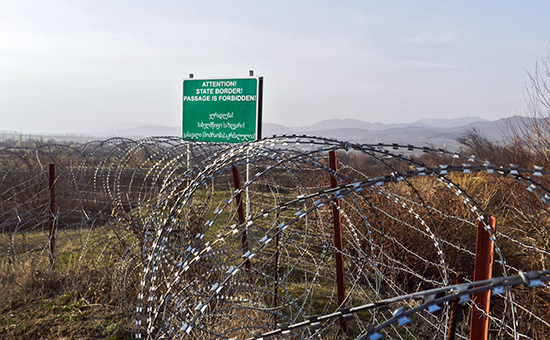
Is Georgian-Abkhaz and Georgian-Ossetian Reconciliation Possible?
Publication: Eurasia Daily Monitor Volume: 13 Issue: 54
By:

On March 10, in a rare tripartite deal, Georgia released four Ossetian prisoners, three of which were serving life sentences on charges of terrorism against the Georgian state. In exchange, the authorities of South Ossetia (Tskhinvali region) and Abkhazia released 14 Georgians, held in these Russian-occupied separatist regions on various charges, ranging from “espionage” to “illegal crossing” of the administrative border (Netgazeti.ge, March 10).
The prisoner release followed months of negotiations and caused a certain degree of euphoria, especially on the Georgian side. Georgia’s State Minister for Reconciliation Paata Zakareishvili triumphantly declared that “if it [was] possible to work honestly over such a difficult issue [prisoner exchange], then the same will be possible over other issues as well.” Moreover, the Abkhazian and Ossetian separatist regimes welcomed the deal as an example of “good will” and “pragmatic cooperation. The prisoner exchange was also praised by international organizations. As the European Union, Organization for Security and Cooperation in Europe (OSCE) and United Nations envoys to Georgia remarked in a joint statement: “coming to a mutual understanding about the release of detainees opens good prospects for further engagement” (Civil Georgia, March 11). Notably, the talks about the swap were initiated by the Abkhazian side itself, even though no Abkhazian prisoners were ultimately released by the Georgian government.
The prisoner exchange affair could have been interpreted as an isolated case of Georgian-Abkhazian and Georgian-Ossetian cooperation, if not for another similar event about a month earlier. Specifically, in February, Tbilisi reached a short-term agreement with Sukhumi, according to which Georgia will continue to supply Abkhazia with electricity from Russia (and pay for it), in order to avoid blackouts in the separatist region caused by low water levels at Enguri River dam—the main source of power for Abkhazia (Channel 1 TV, February 18).
So what is really taking place between Tbilisi and its separatist regions? Is cooperation and reconciliation really picking up steam? A closer look shows that such hopes might be overly exaggerated. The prisoner swap is not new. The sides have released mutual prisoners on previous occasions as well (Civil Georgia, January 2, 2014); however, these agreements never resulted in any breakthrough in Georgian-Abkhazian or Georgian-Ossetian relations.
Moreover, Georgia has been supplying and paying for separatist Abkhazia’s electricity for years. The separatist regime welcomed this arrangement because it makes significant money for its elite, allegedly through the illegal sale of surplus electricity. Overall, as Paata Davitaia, an opposition Georgian politician and himself a refugee from Abkhazia, put it, the local separatist press mocks the Georgian side for its naivety in dealing with the regime in Sukhumi (Rezonansy, March 10).
Things do not look any better on the Ossetian side. In fact, South Ossetia’s breakaway regime is actively discussing the possibility of joining Russia. On February 18, the region’s de facto leader, Leonid Tibilov, stated that he would push to hold a referendum this year in order to gain public support and constitutionally prepare for South Ossetia’s accession to the Russian Federation (TASS, February 19). In another recent development, Russian occupation forces in South Ossetia once again moved the occupation line deeper into Georgia, this time around the village of Jariasheni (Accent.com.ge, March 15). Moreover, people-to-people contacts between Ossetians and Georgians are minimal at best. It is safe to say that occupied South Ossetia is completely isolated from the rest of Georgia, which makes it nearly impossible to lay the groundwork for any kind of public relations between the two ethnic communities.
Against this background, is a reconciliation between Georgians and Abkhaz and Georgians and Ossetians possible at all? Theoretically, yes. But the situation is tremendously complicated by the ever-present Russian factor, which cannot be ignored. Moscow tightly controls every aspect of socioeconomic and political life in the separatist regions. For instance, in reaction to the recent clash between Moscow and Ankara over Turkey’s downing of a Russian fighter jet that violated Turkish airspace, separatist Abkhazia was forced to join Russia’s trade embargo against Turkey, even though the Abkhazians had no desire—and an economic disincentive—to do so (Observer.com.ge, January 20).
Similarly, the Kremlin controls all other big or small aspects of Abkhazia’s and South Ossetia’s agendas. It, therefore, seems quite plausible that Moscow itself sanctioned separatist Sukhumi (and by extension Tskhinvali) to launch these recent talks with Tbilisi about a prisoner exchange. One possible reason for this could be Moscow’s desire to create an illusion within Georgian society that the Georgian-Russian rapprochement is actually working. The ultimate goal is to make Georgians believe that Moscow has the power and willingness—presumably conditional—to push the Abkhaz and Ossetians to talk to the Georgians, mend ties, and possibly reintegrate with Georgia in the future.
Time will tell whether this postulated approach by Russia will have the desired effect on the Georgian population. Regardless, at this stage, it is safe to conclude that a real Georgian-Abkhaz and Georgian-Ossetian reconciliation is not taking place. As the ongoing developments illustrate, Georgia’s relations with its breakaway territories remains fundamentally stalled. They can only be genuinely revitalized when the key obstacles—Russia and the Russian occupation—are removed from the picture. And so far, no such prospect is visible on the South Caucasus’ political horizon.




